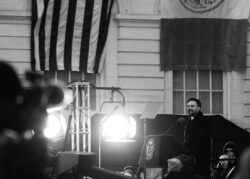When I see this year’s freshman class wandering around campus, I’m filled with nostalgia for my own first year. I remember the excitement of leaving home and meeting new people. I remember excitedly sharing my hopes and dreams to random groups of strangers during NSO. I looked ahead to my time at Georgetown with expectations so high that they were far-fetched and naive.
Many of the first year students I have met this year hold similar expectations to my first-year self. They speculate about GPAs, club positions, and even potential jobs, completely unaware of what actually lies in store for them in the coming months. They have arrived, but now my question is: will they survive?
Within a matter of months, more and more students will undoubtedly succumb to the pressures of what it means to be a “real Hoya.” Quirky band tees will become few and far between, as Ralph Lauren polos crop up everywhere. Vans will be replaced with Sperry’s, and the Class of 2018, like so many before them, will transition into being an army of Jack and Jane Hoyas.
At first, freshmen will worry about making friends and finding their way to “The Red Square.” After a couple of weeks on campus, they will worry about whether or not they have been deemed worthy to make coffee for The Corp or represent their dorm in GUSA Senate. Once midterms hit, they will worry about grades and perhaps even about securing that career-making internship. At Georgetown, the pressure comes constantly from all sides and it can prove too much to handle.
There’s nothing inherently wrong with trying to fit the mold of the typical Georgetown student, or with striving for success on campus. Problems arise, however, when students don’t adjust their personal goals and expectations about college to be both attainable and true to who they are as an individual. Their efforts are focused on an outward image, when they really should be focused on inward development.
Before I arrived at Georgetown, my expectations of my experience here were largely shaped by the presumptions of others. As soon as family and friends learned I was going to Georgetown, they would immediately mention the first thing that came to mind: words like “government,” “international relations,” “Bill Clinton,” and the occasional “meth lab.” So when I physically arrived at Georgetown, I already had a rough mental image of myself as the future ruler of the universe, but I soon discovered that I had a lot of competition. Most of my classmates had equal conviction in their ability to rule the world—and be the best dictator ever.
As my first semester progressed, I continued to strive to become the quintessential Georgetown student, but this become increasingly difficult as I was faced with seemingly endless drawbacks and rejections: my Chinese class proved to be the most difficult ordeal I had ever undertaken; I had an unpleasantly drawn-out break up with my long-distance boyfriend; and it was difficult to get invites to parties, even as a freshman girl. I had lost control over the world I’d managed to maintain as a high schooler, and despite my best efforts, I couldn’t live up to the expectations I had set for myself as a college student.
I needed to hit the “reset” button. For most of my freshman year I had allowed my surroundings to dictate my ambitions and self-worth. It was time to figure out my priorities and come up with a different set of expectations that reflect not who I was in high school nor the kind of person I thought a Georgetown student ought to be, but the person I was in that moment.
A huge component of setting realistic expectations is honesty. No one is perfect, not even educated, cultured, and well-manicured Georgetown students, and, as such, we should not expect perfection from ourselves. That’s not to say that we should not have high expectations of ourselves, but picking your battles is important, especially in an environment like Georgetown. In high school, I could be the person who had their work done three weeks in advance and still be able to go out on the weekends, but I would never be able to do that now. It took a long time for me to see this change as anything but a failure, but at Georgetown my circumstances had changed, so really it would be an exercise in futility to even attempt to maintain a standard like that now.
College life should not be an endless to-do list. Trying to do everything just leaves you with nothing. So, freshmen, if I were you, my first priority would be to spend the next four years figuring out who you were meant to be, not trying to be the person you think you should become.





